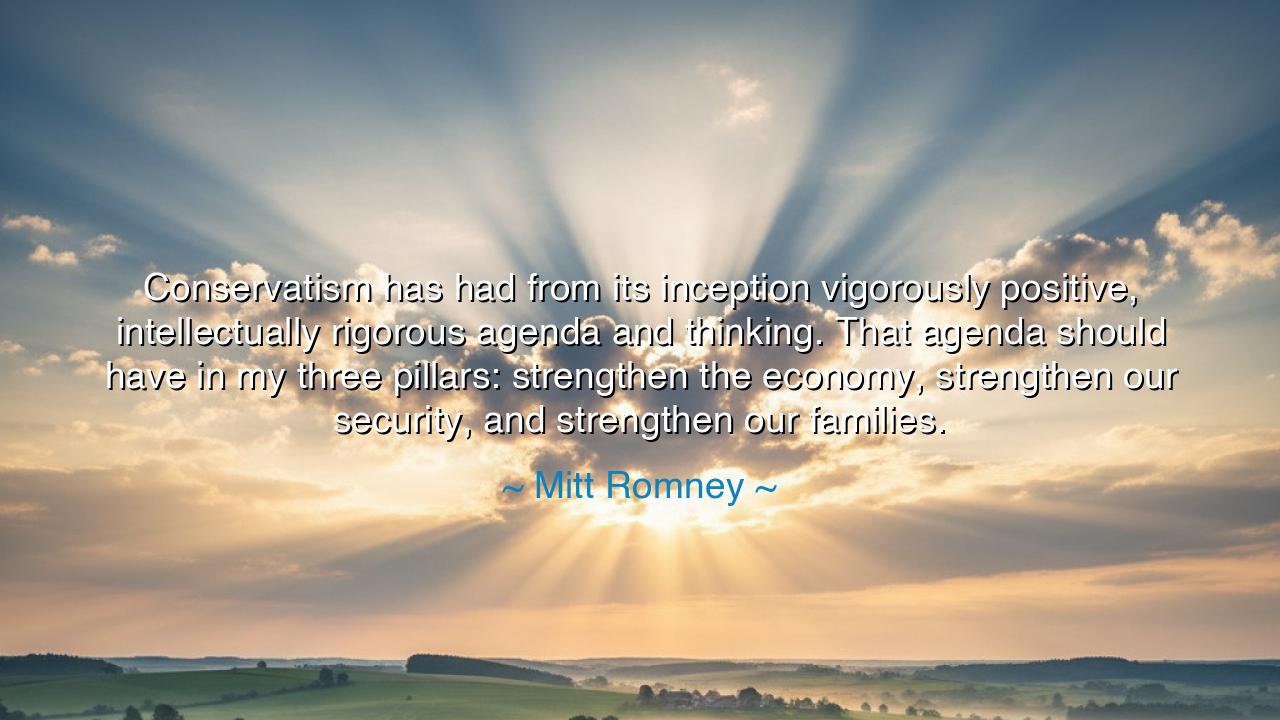
Conservatism has had from its inception vigorously positive
Conservatism has had from its inception vigorously positive, intellectually rigorous agenda and thinking. That agenda should have in my three pillars: strengthen the economy, strengthen our security, and strengthen our families.






The words of Mitt Romney—“Conservatism has had from its inception vigorously positive, intellectually rigorous agenda and thinking. That agenda should have in my three pillars: strengthen the economy, strengthen our security, and strengthen our families”—resound like the declaration of a statesman standing before his people. They remind us that ideologies are not meant to be lifeless dogmas, but living structures built upon foundations that must endure. By speaking of pillars, Romney evokes the image of a temple, whose strength lies not in ornament but in the soundness of its supports. Without these, the structure falls; with them, it shelters generations.
The origin of this truth lies in the oldest traditions of governance. From the republics of Greece to the senate of Rome, leaders have sought guiding pillars to anchor their people. The ancients spoke of justice, temperance, courage, and wisdom as the four cardinal virtues. In like manner, Romney calls forth three central virtues of society: economy, security, and families. To strengthen these is not merely to preserve wealth or defend borders, but to ensure that people may live, flourish, and pass on stability to those yet unborn.
Consider the story of Pericles, the great Athenian leader. He sought not only military victories, but also the strengthening of Athens’ economy through trade and culture, its security through alliances and defense, and its families through civic pride and education. Under his guidance, Athens became not just powerful, but radiant, birthing art, philosophy, and democracy itself. Though centuries separate him from Romney’s words, the principle is the same: societies endure when their leaders nurture these enduring supports.
History also recalls the example of Winston Churchill, who in Britain’s darkest hour held fast to these very pillars. He defended security against the storm of fascism, rallied the economy to fuel the war effort, and invoked the spirit of families—the hearth and home—as the heart worth defending. Churchill’s leadership reminds us that conservatism, rightly understood, is not stagnant preservation, but the safeguarding of essentials so that civilization might continue.
The lesson here is radiant: to speak of conservatism is not merely to cling to the past, but to affirm that there are eternal structures upon which societies must rest. Without a strong economy, the people cannot thrive. Without security, they cannot be safe. Without strong families, the very fabric of the community unravels. These are not luxuries—they are necessities, as vital as the walls, the roof, and the foundation of a house.
Practical wisdom demands that each of us also become guardians of these pillars in our own lives. Strengthen the economy by working with honesty and diligence, by supporting fairness in trade and labor. Strengthen security not only by defending borders, but by cultivating peace, justice, and order in your community. And strengthen families by nurturing love, loyalty, and the teaching of values, for from the hearth flows the strength of the nation.
Thus, let Romney’s words be remembered as more than politics. They are a reminder of the ancient duty of leaders and citizens alike: to preserve the pillars upon which society rests. For kingdoms rise and empires fall, but those that endure are those that hold fast to their foundations. A nation is not secured by wealth alone, nor by armies, nor by laws, but by the harmony of all three—economy, security, and families—standing together like unshakable columns beneath the temple of civilization.






OOanh
Romney’s three pillars of conservatism reflect traditional values, but do they fully account for the complexity of today’s society? For example, strengthening the economy is important, but can it be done without considering inequality or the changing nature of work in the digital age? Likewise, does security just refer to military and national defense, or does it include cybersecurity and the protection of civil liberties?
TTThanh Tran
While Romney’s three pillars of conservatism—economy, security, and family—are certainly compelling, I wonder how they would be implemented in a way that addresses the needs of all citizens. For example, strengthening the economy could mean different things to different people. Would it focus on creating more jobs, or increasing wages for existing jobs? And how does 'security' adapt in a rapidly changing global landscape?
MNMinh Nguyen
Romney’s vision of conservatism seems quite focused on traditional, tangible values like the economy and family, but how do these pillars fit in with changing societal norms? For instance, how does strengthening families in a modern, diverse society account for issues like gender equality, LGBTQ+ rights, or single-parent households? Is there room for these diverse realities within Romney’s framework?
DDDang Duy
I agree with the idea that a strong economy, security, and family are important foundations for any nation, but I wonder if the conservative approach focuses too much on traditional family structures. In today’s world, does the 'family' pillar include diverse family dynamics? Also, how do we ensure that strengthening security and the economy doesn’t come at the cost of individual rights or social equity?
T5Vu Thanh Tung 50
Romney’s three pillars seem to define conservatism in a way that is rooted in traditional values. However, is it enough to strengthen just these three aspects—economy, security, and family? What about the need to address issues like education, healthcare, or environmental sustainability? Can these core pillars evolve to address a broader range of contemporary challenges while staying true to conservative values?